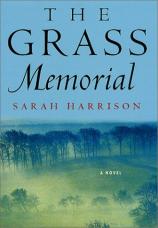The Grass Memorial
Review
The Grass Memorial
A literary device is just that --- a device, a tool, a foundation,
a way to lay ground for the story. It can be anything from diary
entry to Faulknerian stream-of-consciousness. There are many
choices, and most of them have been done before. To be sure, Joseph
Heller was not the first author to weave many separate vignettes
into one overarching story; he was just the funniest. By that same
token, Michael Cunningham didn't invent the three different women,
three separate stories, one startling conclusion approach; he
merely perfected it. So while the literary hook may be old hat, the
resulting story still can be invigorating. There's the rub, because
here's what a plot device can't do. It can't excite a dull subject,
it can't breathe life into cookie-cutter characters, and it can't
make you want to read to the end of a 600-page book. That's the
general problem with Sarah Harrison's THE GRASS MEMORIAL, in which
she hoes the same literary road as Heller and Cunningham before
her.
Problem is, this is not a bad book. That, at least, would be fun to
tear apart. Harrison's prose can be limpid, but it's almost always
lucid, if quite slow moving. No, it's not a bad book, just a fairly
boring one. Harrison accomplishes in 600 pages what could have been
said in half, and without the philosophy or humor that should be
required from a work this size. These characters have been seen
before. There's the loose, boozy rocker who, it turns out, has a
heart. The little brother always jealous of big bro' until a
horrific accident…and did we mention that the younger is, of
course, in love with the elder's wife? The third figure in the
three-way drama is blandest of all, a former soldier who found
unexpected love abroad, then came home to marry and wonder and even
pine.
The three-person tapestry Harrison weaves moves languidly
throughout their lives. They all begin at different points but
reach a convergence of sorts in the end that ties the sections
together. But as our characters bobble through the book, it is
difficult to become emotionally involved. Stella, the singer, shows
little depth in her social character, and her prickliness would
make a cactus cry. Although her story emerges as the most
interesting of the three as she and a married man embark on an
unexpectedly passionate affair, it's difficult to say whether
you're rooting for Stella to win or lose. As for the other two main
characters, 19th century captain Harry and 20th century writer
Spencer, their exploits can be intriguing for a page or two, but
inevitably, Harrison slips back into stereotypes.
There are themes that run through each pastiche, with metaphors to
tie the whole shebang together. Horses, for instance, can be
symbols of both good (the one that surprises Spencer as a lad and
leads him to meet a mysterious writer) and bad (Harry's brother
dies on horseback). They stand for the unexpected. Life and death
are also strong themes in the book, with each character dealing
with at least one of each, sometimes even at the same time. The
book climaxes with a melding together of these central images --- a
horse gives birth. No kidding.
Actually, the book grows more interesting by the end. That's the
literary device at work --- connecting the dots until all the
characters become linked. Here it is Spencer's quest that takes the
shine, as he hunts down a bit more history than the other two.
Surprising revelations are kept in check, which makes it all the
more believable; Harrison got that right. The simple ending closes
out a simple book needlessly made complex by too many pages and too
little action. Better characterization and less reliance on stock
traits could give this novel a terrific boost. Until then, better
to explore using a different device.
Reviewed by Toni Fitzgerald (tonifitz@yahoo.com) on January 22, 2011
The Grass Memorial
- Publication Date: August 23, 2002
- Genres: Fiction
- Hardcover: 608 pages
- Publisher: Thomas Dunne Books
- ISBN-10: 0312290861
- ISBN-13: 9780312290863



